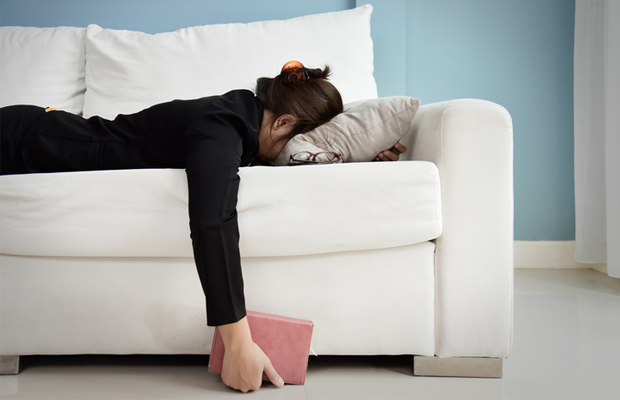
“I’m exhausted.”
“I can’t seem to catch up on my sleep.”
“I can’t get out of bed in the morning.”
“I’m tired of being tired.”
These are common things a person with depression will say. @PJ_palits, Twitter user, artist, depression sufferer and mental health advocate, says, “‘I’m tired’ is not a complaint… It’s merely a fact of life.”
Fatigue usually goes hand in hand with depression, and clinical psychologist Shoshana Bennett, PhD, says, “It’s unusual for fatigue not to be one of the symptoms of depression.” She adds that fatigue can affect people emotionally, cognitively and physically. “It slows down everything.”
Ruth White says the fatigue she suffers along with depression is overpowering. “I find it difficult to get out of bed and once out of bed, just walking can be exhausting. Texting or even watching TV can seem to take a Herculean effort.” White is a clinical associate professor at the School of Social Work at the University of Southern California.
How fatigue is defined in depression
Dr Maurizio Fava explains that fatigue is one of the identified symptoms of major depressive disorder (MDD) as listed in the Diagnostic and Statistical Manual of Mental Disorders, Fourth Edition (DSM-IV) criteria. It is defined as physical fatigue or loss of energy.
“However, in my opinion, fatigue is much more than that. We see apathy and considerable emotional disturbance occurring as a consequence of fatigue. We have also seen high rates of diminished focus, word finding difficulties, and recall problems in fatigued patients with MDD."
Three categories of fatigue commonly occur in patients with MDD; these include physical, cognitive and emotional symptoms.
“The physical symptoms of fatigue include reduced activity, low energy, tiredness, decreased physical endurance, increased effort to do physical tasks, general weakness, heaviness, slowness or sluggishness, nonrestorative sleep, and sleepiness. The cognitive symptoms include decreased concentration, decreased attention, decreased mental endurance, and slowed thinking. The emotional (affective) symptoms of fatigue include decreased motivation or initiative (apathy), decreased interest, feeling overwhelmed, feeling bored, aversion to effort, and feeling low. Given the broad range of related, comorbid symptoms, it can be difficult to differentiate between independent symptoms of fatigue from symptoms directly related to MDD.”
So, why does depression make you tired?
The first issue is quality of sleep. Research by the National Sleep Foundation shows that the the average adult should get between seven and nine hours of sleep every night.
But even if someone with depression regularly clocks between seven and nine hours of sleep per night, they may still wake up feeling tired. Researchers scanned the brains of clinically depressed people and discovered the following:
- It takes depressed people much longer to fall asleep.
- Depressed people sleep less because it takes them longer to fall asleep.
- There is little or no deep sleep, and REM occurs earlier in the night.
- Depressed people may wake up frequently throughout the night, which disrupts their sleep cycles.
- They may wake up earlier in the morning and struggle to fall asleep again, even though they are exhausted.
The second is issue that your body is constantly battling against itself. It’s fighting to stabilise your moods, it’s pushing you to do things that should come easily (getting out of bed, eating, relaxing) but often become a chore when you're depressed.
Psychologist Fuye Ongko offers great insight into why depression causes fatigue. He says, “Energy is needed not only for physical activities. When thinking, our brain works with a certain amount of energy too. It’s like a computer that keeps processing memory. The difference is, when we’re in normal state, it will work in normal flow."
But, when you are feeling depressed, your brain starts to process thoughts in an unhealthy way. "It keeps looping around the depressive matter, and on the other side some part of it also works to solve it. It’s a really burdening process that surely affects our physical condition. We [tend] to overthink.”
Here’s how depression sufferers explain their fatigue linked to depression:
“It’s an energy thief. Little is known about how this happens, or even why, but it starts in the brain. For me, it dulls my emotions, my thinking, my natural enthusiasm for things I like to do, want to do, to the point where I can’t even remember that woman (me) who felt & thought like that. Depression brings on its own kind of pain in all forms, yes even physical, so that dullness I feel from my head to my toes makes me weary and sore. Then I try to sleep. Sleep is the Great Escape from the reality of living with depression. Because even when you’re awake, you don’t feel like doing much of anything other than what’s truly necessary [sic], ” says Maryjesse Johnston.

“Depression influences many aspects of your life. Personally, the amount of energy I expend completing everyday tasks is quite large. Getting out of bed, buying groceries, going to work, socialising. These are not things I do easily. It requires a massive mental effort on my part to plan, rationalize and execute on these activities. Imagine a time, where you were so busy, so overwhelmed with work, errands, friends, and family that you wanted to walk away or scream or hide. Imagine a time where you were so overworked, so busy, so tired of everything you wanted to go home and sleep. Imagine this is your life every day for a decade [sic],” explains Neil L Wilson.
4 ways to cope with fatigue and depression
- Eat a balanced diet
Depression often affects a person's appetite – either they eat too much or too little, which can have a knock on effect and cause fatigue. Ruth White, author of Preventing Bipolar Relapse, says, “Making sure I eat high-fuel foods throughout the day is a way to fight the inclination to skip meals, which would then make me more fatigued.” - Get as much rest as possible
Make sure you practice good sleep hygiene. For author Therese Borchard that means going to bed at the same time every night, and getting up at the same time every morning. She also makes an effort for quiet time in the morning to pray, mediate or read – anything that helps put her mind at rest. A practical tips includes making sure your bedroom is quiet, dark and a comfortable temperature (not too hot or too cold). - Talk to your doctor
Antidepressants are often a cause of fatigue related to depression. Speak to your doctor about finding a medication that makes you feel less tired or drowsy. Your doctor can also give you tips on how to cope with the fatigue. - Get moving
For Lucy Dimbylow, a writer and mother, who is outspoken about living with mental illness, her advice is to move a little. "Notice that I don’t say ‘get some exercise,’ because when you’re severely depressed, it’s next to impossible. But there’s a strong link between physical activity and improved sleep, so if you can, build a little movement into your day – even if it’s just walking to the end of the garden and back."




 Publications
Publications
 Partners
Partners















